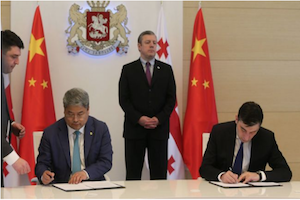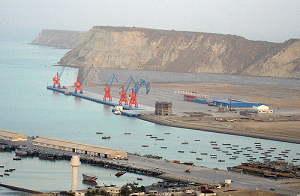Growing Chinese Interests in Georgia
By Emil Avdaliani
March 15, 2018, the CACI Analyst
The Free Trade Agreement between China and Georgia, signed in 2017, came into force on January 1. This will allow Georgian products free access to one of the world’s largest consumer markets, and will free approximately 94 percent of Georgian products from customs taxes. The growth of China’s economic interests has increased Georgia’s hope of playing a role in in Beijing’s Belt and Road Initiative (BRI). By extension, China’s increasing presence in the South Caucasus raises questions regarding the compatibility of Beijing’s interests with those of the region’s traditional hegemon, Russia.

The China-Pakistan Economic Corridor Between Hope and Fear
By Mushtaq A. Kaw
April 26, 2017, the CACI Analyst
In December 2016, China’s Ambassador to Pakistan, Zhao Lijian, stated that “CPEC is working well” with the support of the Pakistani people, notwithstanding certain opposition. The statement is characteristic of China’s and Pakistan’s praise for the China-Pakistan Economic Corridor (CPEC) as a game changer for their respective economies and regional connectivity. Yet in reality, the project faces a variety of intricate economic challenges as well as security threats. Its success will therefore depend upon an inclusive, balanced and sustained China-Pakistan approach towards the forces hostile to the project. Even then, the project will have various geopolitical, geo-economic and geo-strategic implications for the region and the world.

Trade, economy, and pro-Russian opinion in Georgia
By Tomáš Baranec
October 2nd, 2015, The CACI Analyst
According to a recent survey by the U.S. National Democratic Institute, support for membership in the Russia-led Eurasian Economic Union (EEU) has doubled in Georgia since 2014, to 31 percent. Simultaneously, support for the trade agreement between Georgia and the EU fell from 80 percent before the Ukraine crisis to 68 percent in April 2015. Many commentators have linked this development with a temporal disappointment among Georgians with the country’s slow western integration following the Eastern Partnership (EaP) summit in Riga. Others stress the Russian “soft offensive” on Georgia conducted through Russian-sponsored media and NGOs. However, the underlying reasons for why increasing numbers of Georgians become receptive to demands for reorienting the country towards Russia may be deeper, less temporal and much more serious.
New prospects in Armenia-Georgia relations
By Erik Davtyan (19/08/2015 issue of the CACI Analyst)
July was a productive month for bilateral cooperation between Armenia and Georgia. Firstly, the two states expanded their dialogue in the military sphere. On July 16, a delegation headed by Armenia’s first Deputy Minister of Defense Davit Tonoyan visited Tbilisi. A subsequent meeting between representatives of the two defense ministries took place on June 24-25 within the framework of the North Atlantic Council (NAC) Defense Ministers meeting in Brussels, during which Armenia’s and Georgia’s Defense Ministers Seyran Ohanyan and Tinatin Khidasheli discussed bilateral military ties. Khidasheli later explained that the parties agreed “to find new areas of cooperation.”
CACI Analyst, June 24, 2015
Contents
Analytical Articles
EXISTING PARADIGMS FOR RESISTANCE IN THE NORTH CAUCASUS CHALLENGED BY KADYROV, ISIS, by Kevin Daniel Leahy
FOOTBALL NATIONALISM AMONG IRAN’S AZERIS, by Emil Souleimanov
KAZAKHSTAN COMPLETES WTO ACCESSION NEGOTIATIONS, by Nurzhan Zhambekov
AZERBAIJAN AND THE EU, by Natalia Konarzewska
Field Reports
RUSSIA ENHANCES ITS SOFT POWER IN GEORGIA THROUGH LOCAL NGOs, by Eka Janashia
BISHKEK AND TASHKENT FACE UNEASY RELATIONS, by Arslan Sabyrbekov
TAJIKISTAN’S ISLAMIC RESISTANCE PARTY STRUGGLES TO SURVIVE, by Oleg Salimov
ARMENIA AND IRAN HOLD POLITICAL CONSULTATIONS, by Erik Davtyan




